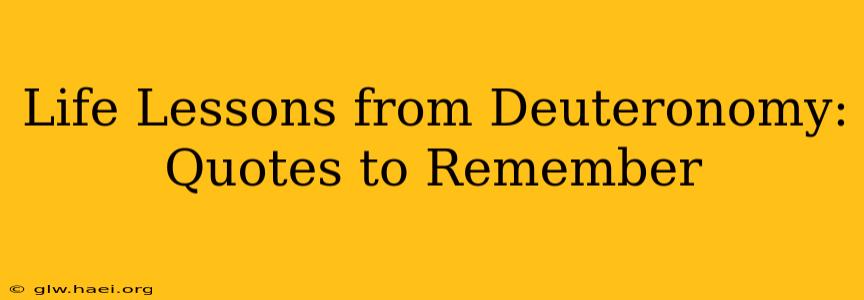Deuteronomy, the fifth book of the Torah (the first five books of the Hebrew Bible), isn't just a historical recounting; it's a profound manual for life, brimming with wisdom applicable to every generation. More than just laws, it’s a collection of powerful speeches by Moses, offering guidance, warnings, and ultimately, a roadmap for a life lived in accordance with God's will. But amidst the detailed commandments, certain passages resonate with timeless truths, offering life lessons that continue to shape perspectives even today. This isn't your typical Sunday school lesson; it's a journey into the heart of Deuteronomy, uncovering its enduring relevance.
Deuteronomy's Core Message: Obedience and Blessing
Before we dive into specific quotes, it's crucial to understand Deuteronomy's central theme: obedience to God's commandments leads to blessing, both individually and communally. Disobedience, conversely, results in hardship and suffering. This isn't a harsh judgment; it's a principle rooted in the idea that God's laws are designed for our well-being, shaping us into the best versions of ourselves. This overarching message frames every quote we’ll explore.
What are the main themes of Deuteronomy?
This is a question many grapple with. Deuteronomy's main themes are multifaceted, intertwining to form a powerful message. Beyond the obedience and blessing paradigm, we find:
- Covenant: The book reinforces the covenant between God and the Israelites, highlighting their responsibilities and God's faithfulness. It's a reminder that relationships, both personal and communal, require commitment and mutual understanding.
- Love and Loyalty: Repeatedly, Deuteronomy emphasizes the importance of loving God and keeping His commandments. This isn't blind obedience; it's a love that stems from gratitude and a deep understanding of God's character.
- Justice and Compassion: Deuteronomy highlights the importance of fair treatment, particularly for the vulnerable. It champions justice for the poor and marginalized, reminding us of our social responsibilities.
- Blessings and Curses: As mentioned earlier, this is a central theme. The consequences of our actions, both positive and negative, are clearly outlined, emphasizing the importance of mindful living.
What are some key verses in Deuteronomy?
Pinpointing key verses is subjective, as the entire book is rich with wisdom. However, some passages stand out for their profound and enduring relevance:
"Love the Lord your God with all your heart and with all your soul and with all your strength." (Deuteronomy 6:5)
This is arguably the most famous verse in Deuteronomy, and for good reason. It encapsulates the core of faith: a total commitment, a devotion that encompasses every aspect of our being. This isn't merely lip service; it's a call to live a life fully surrendered to God's will. This love isn’t passive; it’s active, expressed through obedience and service.
What are the 613 mitzvot?
The 613 mitzvot are the commandments found in the Torah, including Deuteronomy. These commandments cover a vast range of topics, from personal conduct to societal laws. Understanding the 613 mitzvot is a lifelong journey of study and reflection, helping individuals to live a life guided by divine wisdom. While not every commandment is directly relevant to modern life in the same way it was in ancient Israel, the underlying principles—justice, compassion, and holiness—remain eternally significant.
"Choose life, that you and your descendants may live..." (Deuteronomy 30:19)
This powerful verse presents a stark choice: life or death, blessing or curse. It's not simply a physical choice; it's a spiritual one, a call to actively choose obedience and righteousness over selfishness and transgression. This verse emphasizes our agency and responsibility in shaping our own destinies and the destinies of future generations.
How can I apply Deuteronomy to my life today?
Applying Deuteronomy's teachings to modern life involves thoughtful reflection and practical application. It's not about rigidly adhering to every ancient law, but rather about extracting the underlying principles and adapting them to our contemporary circumstances. This might involve:
- Cultivating a deeper relationship with God: This involves prayer, study, and active engagement in faith-based communities.
- Practicing justice and compassion: This entails actively working to fight injustice, support those in need, and treat everyone with fairness and dignity.
- Making ethical choices: This means considering the consequences of our actions, striving to make choices that align with our values and beliefs.
- Prioritizing family and community: This highlights the importance of strong relationships and mutual support.
Deuteronomy isn't a dusty relic of the past; it's a living testament to the enduring power of faith, justice, and love. By reflecting on its timeless wisdom, we can gain valuable insights and guidance for navigating the complexities of modern life. The quotes and principles within this book serve as a compass, guiding us toward a life of purpose, meaning, and spiritual fulfillment.

